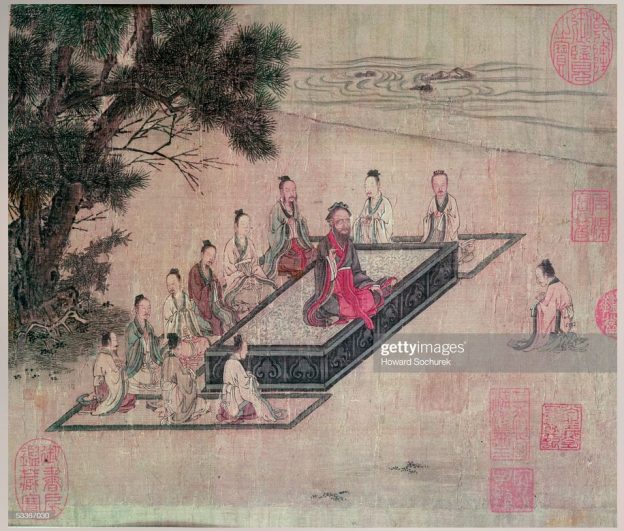As America’s youth become more un-moored from traditions, increasingly libertine, ignorant, morally loose and disrespectful, and lousy at writing, reasoning, and speaking about anything other than raaaaaacism—the Chinese are returning to classical, traditional education.
In Confucianism, the Chinese had a grand and ancient tradition before their native culture was decimated by communism. Unlike our own Traitor Class, their leaders know what strengthens the soul, and they want to infuse the nation with that cultural sustenance the better to make it stronger. Bereft of militarist, American-style multiculturalism to hobble the national spirit, and with their Muslim population heavily controlled—there is no stopping the Chinese.
“Chinese parents are keen on a more Confucian education,” explains The Economist, “so is the government, hoping it will boost patriotism and fill a moral vacuum”:
There is “a growing nationwide demand for guoxue, or ‘national studies.'”
This usually involves learning classical Chinese thought, texts and morals, especially those associated with Confucius. Children … are taught how to bow, how to greet each other politely in the street and how to sit attentively, with back straight and hands placed carefully in their laps. In one room they noisily stamp leaves onto muslin bags to learn an ancient dyeing technique. In others they recite poems, practise calligraphy, perform tea ceremonies and play Chinese chess. But, say teachers, mastering skills is secondary to building character. A child learns to “respect her rival and accept defeat” in chess; in the tea room, to “value what is fragile as you would a porcelain cup”.
After decades of worshiping foreign trends, many people are now interested in such traditions. Television shows include “Chinese Poetry Conference”, in which members of the public are quizzed on classical stanzas. Young people don traditional robes in public. At the heart of the trend is education. …
… Revered for 2,500 years, Confucius was vilified during the 20th century. Guoxue fans speak of “a hundred-year gap”. In 1905 the failing Qing dynasty abolished imperial civil-service examinations based on the sishu, the four Confucian texts. Modernisers saw the beliefs as blocking progress.
The worst assaults were after the Communists came to power in 1949. During the Cultural Revolution, Mao exhorted people to smash anything old. Gangs of Red Guards swarmed Qufu, the sage’s hometown, and blew up his tomb. It was only in the mid-1980s, nearly a decade after Mao’s death, that the anniversary of Confucius’s birth could be marked once again. …
… China’s return to tradition is driven in part by a sense of cultural loss. Many Chinese people are eager to rediscover their heritage, stripped away by decades of Communist rule. But it is also flourishing because it now meshes with official objectives. President Xi Jinping has done more than any other modern leader to elevate Confucian ideas. Soon after coming to power in 2013, Mr Xi visited Qufu, as emperors had done before him. He called for “new and positive roles” for Confucianism.
The ancient system of thought emphasises respect for authority, reverence for ancestors and deference to elders. Confucius taught that such values were essential to achieve moral excellence as an individual. Such upstanding citizens would form the basis for wider social harmony and political stability. Emperors used the philosophy to instill obedience. Mr Xi wants to do the same. Party leaders also approve of Confucianism because, unlike socialism, it is home-grown. It appeals to young nationalists who cheer the party’s call for wenhua zixin, or cultural self-confidence….
…The number of classical texts to be taught in schools increased from 14 to 72. In 2017 the government put out guidelines for having a comprehensive guoxue syllabus in primary and secondary schools by 2025. …
…For many Chinese, the sage’s musings hold a different appeal. In neglected Confucian morals, educators see a set of values that may be a solution to modern social ills, just as some in the West turn to traditional Christian values. Jia Hong, who set up Huaguoshan and two other guoxue pre-schools, says, “Nowadays we hear about so much bullying and brattish behaviour.” Many think a lack of good manners is to blame. Three-quarters of the 200 children at Ms Jia’s kindergartens used to attend regular ones. She says parents remark on how Confucian rituals have calmed their children and helped them focus.



 print
print